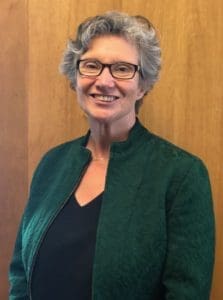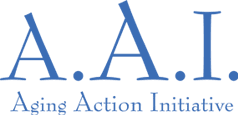 By Linda M. Jackson, Aging Action Initiative Program Director
By Linda M. Jackson, Aging Action Initiative Program DirectorA.A.I.’s Key 2020 Issues
Here’s AAI’s great reveal for February!
After a survey of key leaders and vetting by other stakeholders, the top three issues, coming in at a virtual tie are (in alphabetical order) are:
Caregiving, Housing and Social Connections.
Caregiving is a key issue for a number of reasons:
- For many people, when they become a caregiver, temporary or fulltime, for a family member or themselves, that the responsibility and tasks can be overwhelming.
- The costs of a paid caregiver can be out-of-reach to lower income households.
- Seniors living alone may find the caregiving system inordinately complicated with agency registries, independent caregivers, in-home supportive services for low income households, care managers, care and/or case managers, and more.
- The caregiving profession needs to be strengthened with living wages, a rewarding career path, and mental health services when needed.
Housing ties as a key issue for many reasons as well:
- Older renters across Marin are finding it difficult to stay housed, especially when rents go up faster than Social Security, and tragically if they lose a partner or roommate who helped pay the rent.
- Older people need more housing options, such as housing in shopping centers, co-housing, shared housing, etc.
- Older homeowners who want to add an accessory dwelling unit for a family member, caregiver or companion may be overwhelmed with the logistics of this project, from feasibility studies, clean out of a lifetime of stuff, and the design and construction of the new unit.
- The cost of every-day living is rising, making it challenging for homeowners as they reach their 80s and older and outlive their savings.
- There’s a need for affordable assisted living and memory care facilities as places can be financially out-of-reach of lower income seniors.
It’s no surprise to anyone that social connections tied as the third key issue for older people in Marin. The effects of isolation because of housing patterns and/or loss of family and friends on older adults have been recognized for decades. And now COVID has doubled down on isolation impacts, not just for older folks but for all ages.
- Because of the pandemic, we are now more aware of the pervasive mental health impacts of loneliness, anxiety and depression.
- As they age, people continue to need meaningful social engagement and meaning in life.
- Children, youth and older adults share a unique ability to connect across generations without judgement and will full acceptance.
No surprise that these issues are three of the five bold goals in the California Master Plan on Aging! Nor that these are key components of the age-friendly plans across the County or part of Marin’s Live Long Live Well plan.
These three capture the well-being of older adults – the need for shelter, for companions, for caregiving. How can we ensure that the most vulnerable homeless elders have safe and comfortable places to live? What can we do to help all Marin’s older adults know ‘who to call’ and ‘what to do’ when the need for caregiving arises?
Will the Digital Marin plan include funding to engage older adults in online access programs?
Embedded in these questions is the fact that ageism is a player. We know that older people, especially elders of color, low income older people, older immigrants, and seniors who are lonely and isolated, must be included in ‘equity’ work. That’s the imperative of our work: to remind our leaders, our staff and our colleagues that older people are in that circle of the ignored and the forgotten. Keep looking through that lens of aging equity!

